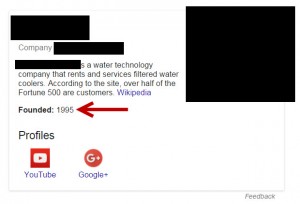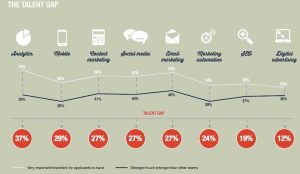 In past pieces on diversity, we’ve covered issues of race, gender, gender identity and religious protections. Now it’s time to talk about workers with disabilities – valuable yet underappreciated talent who also find themselves the victims of stereotypes and discrimination.
In past pieces on diversity, we’ve covered issues of race, gender, gender identity and religious protections. Now it’s time to talk about workers with disabilities – valuable yet underappreciated talent who also find themselves the victims of stereotypes and discrimination.
In May, a Pennsylvania Chili’s employee – whose 10-month-old son has Down syndrome – complained to upper management about his colleagues’ liberal use of the words “retard” and “retarded.” According to his claims, supervisors and co-workers directed the derogatory terms at him several times – even after he explained his personal situation in an attempt to foster understanding of his discomfort and the detrimental effects such language could have on patrons with special needs family members. When he spoke out, informing his immediate superior that he couldn’t tolerate the continued use of the word, he was told, “You can leave then.” He did. His position was terminated the next day.
In response to a targeted social media campaign by the local community, Chili’s issued this statement: “We completely share our guests’ concerns and our teams are working hard to understand the full picture of what happened. We take these comments to heart and do not allow team members to use these words in our restaurants.” And yet, all of the staff involved in the incident remain employed and undisciplined.
It’s difficult to know what really happened in the absence of hard evidence. Technically speaking, the offended party walked off the job. However, the main point here doesn’t concern an exploration into free speech or analysis of at-will employment; it’s about recognizing wider levels of diversity in the workplace, cultivating sensitivity and empathy among team members, maintaining a standard of professionalism, and considering accommodations for one of the most invisible and underrepresented categories of talent: those with special mental and physical needs.
Accommodating disabilities to realize abilities
To instill diverse values, a company must understand all the definitions that come into play when assessing the composition of a multicultural workforce. Diversity reaches far beyond race and gender. It must also include other categories, such as workers in need of accommodations. Too often overlooked in the discussion, this talent has a lot to contribute in exchange for simple support. Consider individuals with Down syndrome, who are becoming increasingly integrated into society, schools, and workplaces. Accommodations can be as simple as alterations to schedules or some job duties. A list of creative solutions suggested by the National Center on Workforce and Disability illustrates a range of supportive practices that cost employers between $ 50 and $ 200 on average, across all categories.
Yet to call these workers disabled is to undermine their abilities. Fans of American Horror Story are surely familiar with actress Jamie Brewer, a player on the show for two seasons. This talented performer has Down syndrome and holds her own alongside Academy Award-winner Jessica Lange. Her roles are memorable because she’s a great actor, not because she has Down syndrome. And what company in its right mind would turn down an opportunity to have Stephen Hawking on the payroll, simply because he would need some minor logistical support for his wheelchair?
Over the past few years, business leaders have also come to realize the strengths of people with Asperger’s. Despite some challenges with socialization and interpersonal small talk, most of these individuals possess high IQs and enjoy jobs that others find repetitive. They excel in data analysis, programming, IT skills, bureaucratic processes found in government agencies such as the DMV, court reporting, library science, and even retail positions.
The benefits of accommodating and including disabled talent
According to the U.S. Chamber of Commerce, accommodating disabled talent – as all other classifications of diversity – strengthens a company’s bottom-line. The report cites cases from 3M, Pepsi, Merck, and AT&T. A similar study from DePaul University found that the organizations it researched enjoyed low absenteeism and stellar retention levels. Longevity among disabled talent was above average when compared with the rest of the workforce. They also described these workers as loyal, reliable, committed and high performing producers. Better yet, the diversification of the business culture promoted a more positive work environment for everyone.
What’s really interesting is that those same companies noticed that people with disabilities did not apply to jobs directly — they came through staffing curators. As early as 1998, according to the Center for Association Leadership, staffing professionals have been “leading the charge” to recruit and train talent with disabilities.
“An exciting synergy is under way between HR professionals who increasingly use temporary staffing agencies to find qualified employees and a huge population of disabled but capable individuals actively seeking full-time work opportunities,” the association pointed out at the time.
Staffing curators are a critical link between professionals with disabilities and jobs
Today, with the incredible rise of the blended workforce and complementary talent, MSPs and staffing suppliers have assumed greater roles in human resources functions: sourcing, placing, training, qualifying and matching top talent to an increasing number of job openings. For motivated workers with disabilities, staffing professionals represent a crucial link to employers who want hardworking and devoted professionals. It’s important to note that only 15 percent of people with disabilities were born with those conditions – the rest became disabled later in life, after years of developing vocational skills and experience. Unfortunately, a stigma against them still persists in some corners of the business world.
As Manpower illustrated in a pivotal 2001 report on workers with disabilities, “The cost of accommodation to people with disabilities is not high, and the benefits far outweigh the costs. Employees with disabilities contribute to productivity, are satisfied and are retained by employers.”
The good news is that a growing population of business leaders are recognizing the valuable contributions talent with disabilities bring to their organizations. For MSPs seeking to capitalize on the goldmine of untapped potential, staffing curators are the best prospectors.
Staffing curators leading the charge to place workers with disabilities
Staffing professionals began making strong inroads to cultivating disabled talent in the late 1980s, realizing that these overlooked workers often boasted higher performance ratings (with 90 percent receiving reviews ranked “good” or “excellent”), longer tenures, greater productivity, and higher cost efficiencies for employers. Staffing curators also understand the best practices and compliance regulations associated with hiring, accommodating and managing this talent.
- They treat applicants with disabilities the same as other candidates. They utilize skills assessments, application reviews, personal interviews, testing and vetting processes tailored to the job requirements – not the condition of the talent.
- They don’t just scour online job boards for candidates – they develop social recruiting networks that source talent from associations, groups, foundations, community organizations, and others focused on serving the needs of people with disabilities.
- They host immersive training programs where they can simulate the conditions and tasks of the client company, which allows them to mentor and make adjustments prior to the first day of work.
- They use the same intense analytics, job profiling and matching processes to locate the best business cultures available for their candidates, ensuring a mutual alignment of interests, values, mission, and duties.
- They work closely and proactively with MSPs to report and request valid accommodations, create policies that comply with ADA regulations and minimize potential disruptions before the onboarding process begins.
Staffing curators and MSPs create a disabled friendly environment for clients
Regardless of the talent, MSPs and their staffing partners play a vital role in helping clients find the best workers and maintain compliance with all labor standards. Implementation and transition processes provide MSPs with excellent opportunities to scrutinize every facet of the business environment. Preparing the site for the introduction of complementary workers and staffing suppliers is a fundamental part of discovery and program rollout.
During this time, MSPs and staffing curators have the opportunity to identify, and include recommendations for, accommodations: disabled-friendly restrooms, break rooms, water fountains, building access, parking and transportation, emergency exits, potential hazards and more. In doing so, they eliminate obstacles before problems arise by addressing accessibility issues with work spaces, the tools and technologies in place, information distribution protocols, training approaches, and office equipment.
Under law, workers who require accommodations must inform employers of their disability and request a reasonable accommodation. The beauty of engaging talent through MSPs and their staffing partners is that this information is known upfront – a client’s HR department will not be suddenly confronted or blindsided by accommodation needs after-the-fact.
Empowering people with disabilities and the organizations they support
Clearly, people who are not considered neurotypical or physically unchallenged have significant contributions to offer, and are capable of high quality output. It’s not just a matter of enforcing accommodations, it requires a shift in mindset and cultural perspective. Working with diverse talent makes us better people. The experience can be inspirational and teaches us new perspectives, new ways of looking at our world, and new approaches to overcoming challenges. As the industry continues to worry about unfilled job openings, a candidate-controlled market and new ways to attract skilled talent, staffing curators may already have a vast pool of capable and qualified workers waiting to seize your opportunities.
(173)








